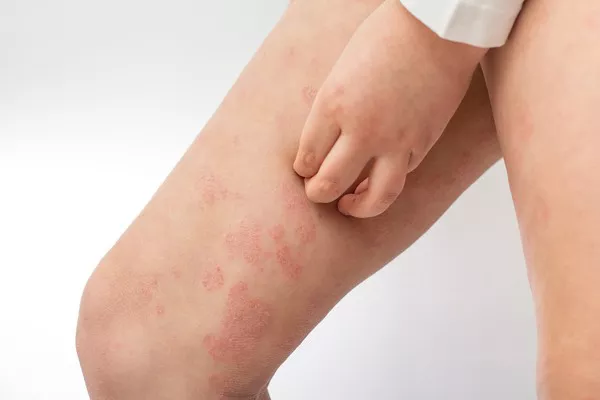Eczema, a chronic skin condition characterized by inflammation, itching, and irritation, affects millions of individuals worldwide. While there is no cure for eczema, managing its symptoms is paramount to enhancing quality of life. Home remedies offer a holistic approach to alleviate discomfort and promote skin health. In this comprehensive guide, we delve into various home remedies tailored to combat eczema’s relentless symptoms, ranging from moisturizing techniques to stress management strategies.
Understanding Eczema:
Eczema, also known as atopic dermatitis, manifests as red, dry, itchy patches on the skin. Common triggers include allergens, irritants, stress, and genetic predisposition. It’s crucial to differentiate between various types of eczema, such as atopic dermatitis, contact dermatitis, and dyshidrotic eczema, as remedies may vary depending on the underlying cause.
Atopic dermatitis, the most prevalent form of eczema, often occurs in individuals with a family history of allergic conditions like asthma or hay fever. Contact dermatitis, on the other hand, results from direct contact with irritants or allergens, leading to localized inflammation. Dyshidrotic eczema primarily affects the hands and feet, presenting as small blisters accompanied by itching.
Home Remedies for Eczema Symptoms:
1. Moisturizing:
Regular moisturizing plays a pivotal role in managing eczema symptoms by restoring the skin’s natural barrier function. Opt for fragrance-free creams and ointments to avoid exacerbating irritation. Natural remedies like coconut oil, renowned for its moisturizing properties, can provide relief without the risk of added fragrances or chemicals. Similarly, oatmeal baths and aloe vera gel offer soothing effects, reducing inflammation and itchiness.
2. Soothing baths:
Lukewarm baths infused with colloidal oatmeal, baking soda, or apple cider vinegar provide therapeutic benefits for eczema-prone skin. Colloidal oatmeal, in particular, forms a protective barrier, retaining moisture and soothing inflammation. Baking soda helps balance pH levels, while apple cider vinegar possesses antimicrobial properties, aiding in skin healing.
3. Cooling the skin:
Cool compresses or wet wraps serve as effective remedies for alleviating itching and inflammation associated with eczema flare-ups. Applying a cool, damp cloth to affected areas can provide immediate relief, while wet wraps, consisting of damp bandages or clothing, lock in moisture and enhance the effectiveness of topical treatments.
4. Dietary changes:
Dietary modifications can complement conventional eczema treatment by addressing underlying inflammation. Eliminating trigger foods such as dairy, gluten, and processed sugars may reduce flare-ups in some individuals. Conversely, incorporating anti-inflammatory foods like fatty fish, leafy greens, and probiotics can promote skin health and overall well-being.
5. Stress management:
The mind-body connection is undeniable in eczema management, as stress often triggers flare-ups and exacerbates symptoms. Engaging in relaxation techniques such as meditation, deep breathing exercises, or yoga can mitigate stress levels and improve eczema outcomes. Prioritizing self-care and adopting stress-reducing practices are essential components of holistic eczema management.
Safety and Precautions:
1. Patch testing:
Before incorporating any new remedy into your eczema care routine, perform a patch test on a small skin area to assess for potential allergic reactions. This precautionary measure can prevent adverse effects and ensure compatibility with your skin type.
2. Consulting a doctor:
While home remedies offer accessible solutions for managing eczema symptoms, consulting a healthcare professional is paramount for accurate diagnosis and personalized treatment. Severe or persistent eczema may require prescription medications or specialized interventions to effectively control symptoms and prevent complications. Additionally, healthcare providers can offer guidance on the safe use of home remedies and address any concerns regarding their efficacy or potential side effects.
Additional Tips:
1. Maintaining a healthy lifestyle:
A well-balanced diet, regular exercise, and adequate sleep are foundational pillars of overall health, including skin health. Prioritize nutritious foods, stay hydrated, and engage in physical activity to support your body’s natural healing processes and minimize eczema flare-ups.
2. Identifying and avoiding triggers:
Understanding your eczema triggers empowers you to make informed lifestyle choices and preemptively mitigate flare-ups. Keep a journal to track potential triggers, whether they’re environmental factors, dietary habits, or stressors, and take proactive steps to minimize exposure whenever possible.
3. Choosing gentle, fragrance-free skincare products:
Opt for hypoallergenic, fragrance-free skincare products formulated specifically for sensitive skin. Harsh chemicals and fragrances found in many conventional products can exacerbate eczema symptoms, so prioritize gentle cleansers, moisturizers, and sunscreen to nurture your skin without irritation.
4. Keeping fingernails short to prevent scratching:
Trimming your fingernails short reduces the risk of unintentional scratching, which can exacerbate eczema lesions and compromise skin integrity. Additionally, wearing cotton gloves at night can prevent nighttime scratching and promote healing while you sleep.
5. Wearing loose, breathable clothing:
Choose loose-fitting, breathable fabrics like cotton or bamboo to minimize skin irritation and allow for adequate airflow. Avoid synthetic materials and tight clothing that can trap moisture and exacerbate eczema symptoms, especially during hot and humid weather.
Conclusion
In conclusion, eczema management encompasses a multifaceted approach that addresses both symptom relief and underlying triggers. Home remedies offer accessible, cost-effective solutions for individuals seeking natural alternatives to complement conventional treatment methods. By incorporating these holistic strategies into your daily routine and prioritizing skin health, you can effectively manage eczema symptoms and improve overall well-being. However, it’s essential to exercise caution, consult healthcare professionals as needed, and prioritize safety and efficacy in your eczema care regimen.

























